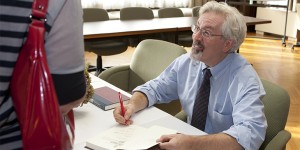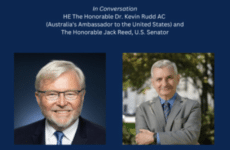By Lauren Kane;
International News Editor,On Wednesday, November 28, an audience filled the Young Building ballroom to hear G. Wayne Miller’s lecture “Where Stories Take Us: Story in the Public Square”. The lecture was a part of the Pell Center for International Relations lecture series.
To begin his lecture, Miller emphasized that stories have been relevant from the cave paintings done by the first humans all the way until the present day. Not only are stories for entertainment, but they have the power to make a difference in people’s lives
“The (stories) that move us, that touch us, are the ones we remember, and they can cause change,” said Miller.
Miller spoke of how important it is to tell stories that do have objective facts, but also portray the human emotion behind the statistics. What makes a story relevant is the added emotions that fill out the facts and figures.
As examples of this principle, Miller continued the lecture with short but powerful summaries of stories that Miller and The Providence Journal had done over the years. They were the stories of people and places, what it was like to be them, or to be there. He spoke of a story he had done on a dying man and the man’s spiritual counselor, and the emotions that accompanied such a relationship.
Many stories emphasized the affect that storytelling has on public policy. Such stories included the one addressing the tragic Station Nightclub fire. Telling the story of those people killed, and their families, helped to change public policy on safety standards in venues across the country. He also wrote about the work done by journalists to tell the stories of those being mistreated in mental health institutions, and the immense affect such journalistic endeavors had on public policy.
During the session for questions and discussion, an audience member addressed the issue of how to avoid advocacy when telling a story. Miller answered that he always keeps stories truthful and objective, and the facts advocate for themselves.
“Advocacy is a part of our humanity,” said Miller.
Miller is a staff writer for the Providence Journal, a documentary filmmaker, the author of a novel, a short story collection, and seven books of nonfiction.
This lecture was the last Pell Center event of the semester. However, the Pell Center will be revisiting this topic in April 2013, when the Pell Center will address many of the same themes discussed during Miller’s lecture.
“We intend to examine the roles of storytelling in the public square,” said Jim Ludes, director of the Pell Center for International Relations.
More information concerning the Pell Center’s initiative on storytelling will be available in the spring semester.















